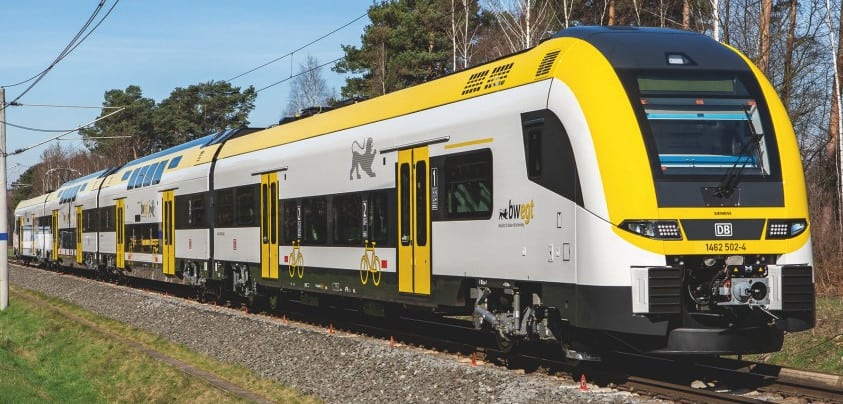Siemens Mobility’s new Mireo train has received initial approval from the German Railway Authority to offer regional service (RB) on the Offenburg – Freiburg – Basel/Neuenburg (Rhine) route. The approval comes in just 38 months after the first order for the new Mireo regional multiple-unit trains developed by Siemens Mobility.
In February 2017, the Ministry for Transport in the state of Baden-Württemberg ordered 24 Mireo trains and 15 Desiro HC double-decker trains to be operated by DB Regio, a regional business unit of Deutsche Bahn. The Mireo train has received initial approval in time for the timetable change in June 2020.
Baden-Württemberg’s Transport Minister Winfried Hermann said: “The new trains for the Rhine Valley Railway make regional rail transport in the region even more attractive and offer an incentive to make greater use of rail, a climate-friendly means of transport. This is another building block in the state’s policy of developing Baden-Württemberg into a pioneer of sustainable mobility.”
“We are pleased that from mid-June, our passengers will be able to get to their destination in new trains much faster than before in local transport. We connect North Baden from Karlsruhe to Switzerland with an attractive transport concept,” said David Weltzien, Chairman DB Regio Baden-Württemberg.
“The new Mireo train, which combines economic viability with sustainability over the entire life cycle of the train, is a successful project for Siemens Mobility. The train received its initial approval from the authorities on schedule and Siemens Mobility has already been awarded a total of seven Mireo fleets and six Desiro HC fleets since its launch. We are delighted that our Mireo and Desiro HC trains will improve passenger experience and the capacity of the Rhine Valley Railway,” said Sabrina Soussan, CEO of Siemens Mobility.

Along with the 24 Mireo trains, 15 double-decker Desiro HC trains from Siemens Mobility will also operate as a regional express on the Karlsruhe – Offenburg – Freiburg – Basel route. These additions will give a clear distinction between express service between the region’s major cities and a regional or commuter system similar to the S-Bahn, stopping at all stations.
The Mireo train has been designed as a scalable articulated train. All technical components are installed either beneath the floor or on the roof, leaving all the interior space available for the passengers’ comfort. The three-car Mireo trains have a seating capacity of 220 seats and can reach a maximum speed of 160 km/h. The trains are also suitable for the disabled and bicyclists. There are multi-purpose areas with ample space for up to 27 bicycles.
The double-decker Desiro HC is particularly characterized by its already proven reliability and very high availability and is very popular with passengers because of its large capacity and comfort.
Siemens Mobility has designed the Mireo and Desiro HC trains to be especially eco-friendly. The trains are lightweight, energy-efficient and optimized in terms of aerodynamics. Due to their modern design principles, energy consumption can be reduced by up to 25 per cent compared to vehicles on the market with the same capacity.
Both the Mireo and Desiro HC trains incorporate predictive monitoring in which all data relevant for diagnostics, maintenance and train control is collected and transmitted to the trackside control centre. This enables the operator to plan maintenance in advance and prevent breakdowns.
Browse our Projects database to get detailed data exclusively on rail projects in Africa.
